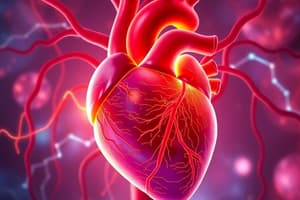Podcast
Questions and Answers
Which characteristic is used to evaluate pediatric heart murmurs?
Which characteristic is used to evaluate pediatric heart murmurs?
- Location of radiation
- Pitch of the murmur
- Loudness or intensity (correct)
- Duration of the murmur
Which type of murmur is caused by turbulent flow in the left ventricular outflow tract?
Which type of murmur is caused by turbulent flow in the left ventricular outflow tract?
- Pulmonary Flow Murmur
- Still’s Murmur (correct)
- Venous Hum
- Supraclavicular Flow Murmur
Which type of murmur is associated with turbulent flow from jugular veins and superior vena cava?
Which type of murmur is associated with turbulent flow from jugular veins and superior vena cava?
- Venous Hum (correct)
- Mammary souffle
- Supraclavicular Flow Murmur
- Pulmonary Flow Murmur
Which pathologic murmur is characterized by a continuous machinelike sound?
Which pathologic murmur is characterized by a continuous machinelike sound?
Which pathologic murmur is described as a late crescendo murmur with midsystolic click?
Which pathologic murmur is described as a late crescendo murmur with midsystolic click?
Which characteristic describes the murmur of aortic regurgitation?
Which characteristic describes the murmur of aortic regurgitation?
Where is the murmur of mitral/tricuspid regurgitation loudest?
Where is the murmur of mitral/tricuspid regurgitation loudest?
Which type of murmur is associated with turbulent flow in dilated breast blood vessels?
Which type of murmur is associated with turbulent flow in dilated breast blood vessels?
What is the characteristic sound of mitral stenosis?
What is the characteristic sound of mitral stenosis?
Where is the murmur of aortic stenosis loudest?
Where is the murmur of aortic stenosis loudest?
What type of murmur is associated with turbulent flow in the right ventricular outflow tract?
What type of murmur is associated with turbulent flow in the right ventricular outflow tract?
Which cardiac cause of chest pain is characterized by a holosystolic, harsh-sounding murmur loudest at the tricuspid area?
Which cardiac cause of chest pain is characterized by a holosystolic, harsh-sounding murmur loudest at the tricuspid area?
Which condition should be avoided when treating infants, individuals with Wolff-Parkinson-White syndrome, and children with congestive heart failure?
Which condition should be avoided when treating infants, individuals with Wolff-Parkinson-White syndrome, and children with congestive heart failure?
Which type of syncope is the most common noncardiac cause of loss of consciousness and postural tone due to transient cerebral underperfusion?
Which type of syncope is the most common noncardiac cause of loss of consciousness and postural tone due to transient cerebral underperfusion?
Which type of syncope accounts for 10% of cases and is associated with arrhythmia without prodromal symptoms?
Which type of syncope accounts for 10% of cases and is associated with arrhythmia without prodromal symptoms?
Which condition is an example of a non-cardiac cause of chest pain that is most commonly associated with asthma, pneumonia, and pleural effusions?
Which condition is an example of a non-cardiac cause of chest pain that is most commonly associated with asthma, pneumonia, and pleural effusions?
Which dysrhythmia is characterized by SA node dysfunction and is caused by bradydysrhythmias?
Which dysrhythmia is characterized by SA node dysfunction and is caused by bradydysrhythmias?
Which condition should be avoided in the treatment of bradydysrhythmias in infants and children with congestive heart failure?
Which condition should be avoided in the treatment of bradydysrhythmias in infants and children with congestive heart failure?
Which type of syncope is characterized by transient cerebral underperfusion with spontaneous recovery and is associated with a prodrome of dizziness, pallor, nausea, and diaphoresis?
Which type of syncope is characterized by transient cerebral underperfusion with spontaneous recovery and is associated with a prodrome of dizziness, pallor, nausea, and diaphoresis?
Which cardiac cause of chest pain is associated with coronary artery abnormalities, mitral valve prolapse, and left ventricular outflow tract obstruction?
Which cardiac cause of chest pain is associated with coronary artery abnormalities, mitral valve prolapse, and left ventricular outflow tract obstruction?
Which type of syncope is characterized by a sudden loss of consciousness and postural tone due to transient cerebral underperfusion with spontaneous recovery, and accounts for 90% of cases?
Which type of syncope is characterized by a sudden loss of consciousness and postural tone due to transient cerebral underperfusion with spontaneous recovery, and accounts for 90% of cases?
Which type of syncope is characterized by syncope with exercise, heart palpitations, or chest pain, and is associated with a history of cardiac abnormalities and abnormal cardiac physical exam or ECG?
Which type of syncope is characterized by syncope with exercise, heart palpitations, or chest pain, and is associated with a history of cardiac abnormalities and abnormal cardiac physical exam or ECG?
Flashcards are hidden until you start studying




